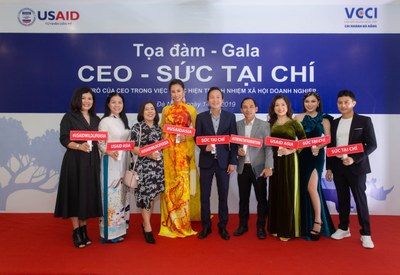USAID Mobilizes Vietnamese Business Community to Promote a Wildlife Consumption- Free Lifestyle
In Vietnam, the high demand for wildlife has led to the extinction of rhinos in the country and contributes to the poaching of rhinos in Africa. Research has indicated that Vietnamese businesspeople comprise a key user group of rhino horn and other illegal wildlife products in the country.
Recognizing the crucial role that the Vietnamese business community has to play in reducing demand for illegal wildlife products, USAID Wildlife Asia has been reaching out to the business sector through the engagement of civil society organizations (CSOs) such as the Vietnam Chamber for Commerce and Industry (VCCI) and the Vietnam Automobile Transportation Association (VATA), who provide critical training and guidance to the community.
Since 2018, USAID Wildlife Asia has been empowering VCCI and VATA to take a leading role in countering wildlife crime through the third phase of the Chi Initiative, an established social marketing program to reduce demand for rhino horn and illegal wildlife products targeting Vietnamese businessmen. The initiative uses evidence-based behavioral science to help businessmen recognize that their Chi, or strength of will, comes from within them, rather than from rhino horn.
Leveraging VCCI’s advocacy of business models that contribute to sustainable development, USAID Wildlife Asia encourages companies to adopt wildlife-related corporate social responsibility (CSR) policies. To date, VCCI’s network of master trainers, a group of instructors charged with leading and facilitating business workshops for members, has trained nearly 6,000 businesspeople in counter wildlife trafficking (CWT) and social behavior change communication (SBCC). This partnership between USAID Wildlife Asia and VCCI has recruited nine outstanding business leaders to be Chi Champions who advocate CWT and promote Chi messaging in their network.
On the other hand, the partnership with VATA focuses on mitigating the risks for transport companies of unknowingly becoming involved in illegal wildlife trade and encouraging business organizations to undertake CSR activities.
“In partnership with USAID Wildlife Asia, we have trained over 100 transport heads, managers, and driver team leaders from 40 leading transport companies on risk management techniques to avoid involvement in illegal wildlife trafficking, including legal penalties and financial losses associated with this criminal activity. We are committed to continuing this training to disrupt the illegal wildlife trade chain,” said VATA chairman Mr. Nguyen Van Quyen,
Both VCCI and VATA have taken ownership of Chi messaging and have gone beyond their mandate to deliver the messaging throughout their networks. So far, nearly six million individuals, including businesspeople, have been exposed to behavior change messaging via standees, presentations, workshops, and other means.
A key factor in the productive partnership is that the leaders of VCCI and VATA have reconciled their sense of personal responsibility for wildlife protection with the goals of their organizations, and have committed to the cause of eliminating illegal wildlife consumption from both their sectors and society in general.
As a result of VCCI and VATA’s advocacy, hundreds of businesses have disseminated the social behavior change communication messaging in their networks and integrated counter wildlife trafficking principles into company policies and training manuals. This is inspiring other companies to step up and join the fight against wildlife crime. As these efforts reverberate around the local business community, Vietnamese CSOs are contributing not only to changing behavior among Vietnamese businesspeople, but also in shifting country-wide attitudes on the acceptability of illegal wildlife products.


